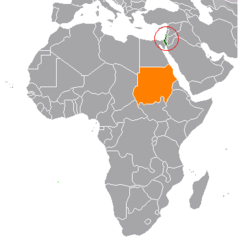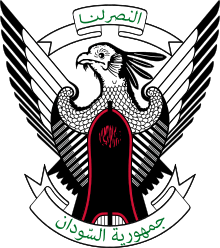Israel–Sudan relations
Israel and Sudan refers to diplomatic ties between Israel and Sudan. Officially, the two countries do not have bilateral relations, but according to Israeli Deputy Minister for Regional Cooperation Ayoob Kara, they maintain covert ties.[1]
 | |
Israel |
Sudan |
|---|---|
History
Sudan officially went to war with Israel in the 1948 Arab–Israeli War and the Six-Day War in 1967 though it did not participate in the Suez Crisis. In the early 1950s, Sudan – then still not independent – had active trade relations with Israel.[2]
Sudan did not actively participate in the Yom Kippur War, as Sudanese forces arrived too late to participate. Israel backed Christian militias that fought the Sudanese government in the First and Second Sudanese Civil Wars.
In January 2016, Sudanese Foreign Minister Ibrahim Ghandour floated normalized ties with Israel provided the U.S. government lifts economic sanctions.[3] Sudanese President Omar al-Bashir followed that up by saying in an interview with Saudi newspaper Okaz, "Even if Israel had conquered Syria, it would not have inflicted the destruction taking place there right now, would not have killed the number of people killed so far and would not have expelled people the way they are being expelled now."[4]
Israel flew medics and equipment to Sudan to try and save a diplomat infected with COVID-19.[5]
It was revealed in early September 2016 that Israel had contacted the U.S. government and other Western countries and encouraged them to take steps to improve relations with Sudan in wake of the break in relations between the Arab-African country and Iran in the past year, all but confirming a secret alliance between Sudan and Israel.[6] Kara later revealed at an event in Beersheba that he was maintaining contacts with many Sudanese officials and did not deny that a Sudanese official had recently visited Israel.[7] In February 2020, Israeli Prime Minister Benjamin Netanyahu and the Chairman of the Sovereignty Council of Sudan, Abdel Fattah al-Burhan, met in Uganda, where they both agreed to normalize the ties between the two countries.[8] Later that month, Israeli planes were allowed to fly over Sudan.[9]
References
- i24News (25 January 2016). "01/24: Kara: Israel has ties with Saudi Arabia, Sudan, Oman, UAE, etc..." – via YouTube.
- Gabriel R. Warburg: The Sudan and Israel – An Episode in Bilateral Relations, in: Middle Eastern Studies, Vol. 28, No. 2 (April 1992), pp. 385–396.
- Sudan said willing to consider normalizing ties with Israel Times of Israel
- "Will Israel revive its relationship with Khartoum?". 17 March 2016.
- https://www.timesofisrael.com/tv-israel-sent-doctors-to-sudan-in-bid-to-save-diplomat-behind-secret-ties
- Ravid, Barak (7 September 2016). "Israel Urges U.S., Europe to Bolster Ties With Sudan, Citing Apparent Split With Iran" – via Haaretz.
- "معاريف: مسؤول سوداني زار تل أبيب.. ووزير إسرائيلي: 'لا تورطوني'". صدى البلد. 25 February 2017.
- Landau, Noa (3 February 2020). "Netanyahu, Sudanese Leader Meet in Uganda, Agree to Start Normalizing Ties" – via Haaretz.
- "Netanyahu says Israeli planes have started overflying Sudan". Reuters. 16 February 2020.

